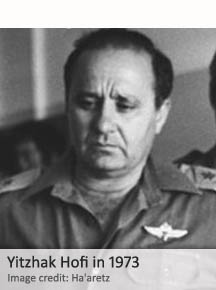Yitzhak Hofi, controversial head of Israeli Mossad, dead at 87
September 16, 2014 Leave a comment
 By IAN ALLEN | intelNews.org
By IAN ALLEN | intelNews.org
Yitzhak Hofi, who led the Israeli covert-action agency Mossad during one of its most important periods, has died at the age of 87. Born in Tel Aviv during the time of the British Mandate of Palestine, Hofi rose through the ranks of the Israeli Defense Forces before assuming directorship of the Mossad in 1974. The young Hofi joined the Palmach, an elite unit of the Haganah, which was the most militant wing of the Zionist community in Palestine. The British occupation forces designated the Haganah a terrorist organization at the time. After Israel was formally established, Hofi was one of many members of the Palmach that formed the founding backbone of the IDF. Having fought in the 1948 Palestine War, Hofi rose through the ranks of the IDF throughout the next three decades, serving in the 1967 Six-Day War and the 1973 Yom Kippur War. Following the end of that conflict, an internal government investigation found that David Elazar, the IDF’s Chief of Staff, was personally responsible for many of Israel’s military failures during the clashes. Elazar was forced to resign in 1974, and Hofi served in his place for a brief period in an interim capacity. But he resigned in protest after Israel’s Defense Minister at the time, Moshe Dayan, appointed his protégé Motta Gur to the post. A few months later, Israel’s newly elected Prime Minister, Yitzhak Rabin, asked Hofi to assume the directorship of the Mossad. Hofi accepted Rabin’s nomination and went on to lead the Israeli intelligence agency until 1982, during one of the Jewish state’s most important periods. Although his allies credit him with exerting a moderate style of leadership, his critics blame him for forging close ties between the Mossad and the rightwing Kataeb Party in Lebanon. In September of 1982, Kataeb’s Phalangist militia members perpetrated the Sabra and Shatila massacres, in which as many as 3,500 civilians, most of them Palestinians and Lebanese Shiites, were killed, some say with direct Israeli complicity. At the same time, however, Hofi’s political maneuvering in Morocco laid the groundwork for the secret summit in Rabat between Israel and Egypt. The talks led to the 1979 peace treaty between the two countries, and prompted the historic visit by Egyptian President Anwar Sadat to the Jewish state. Hofi is also remembered for his important planning role in Operation ENTEBBE, in which a group of 100 Israeli commandos raided an Air France airliner that had been hijacked by Palestinian and German militants and flown to the Entebbe International Airport in Uganda. All but three of the 106 hostages were rescued, while all seven hijackers were killed by the Israeli commandos. Hofi was buried on Monday in a high-profile ceremony, in which Israeli Prime Minister Benjamin Netanyahu delivered the eulogy.






